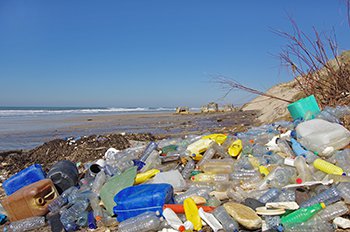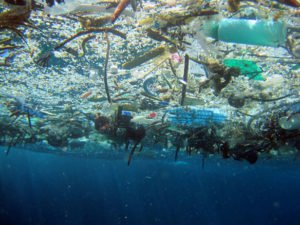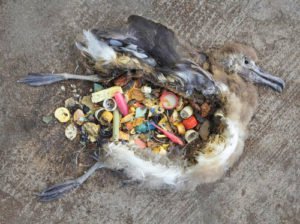The Problem with Plastics
 We have produced more plastic in the ten years than in the whole previous century. With that increase has also come a rise in pollution—nearly 80% of all waste on our land and shorelines and in our oceans now consists of plastic debris. While plastic pollution threatens our oceans, endangers marine life and congests our landfills, it also has a significant impact in our homes and on the health of our families.
We have produced more plastic in the ten years than in the whole previous century. With that increase has also come a rise in pollution—nearly 80% of all waste on our land and shorelines and in our oceans now consists of plastic debris. While plastic pollution threatens our oceans, endangers marine life and congests our landfills, it also has a significant impact in our homes and on the health of our families.
Gyres
Gyres are massive, rotating whirlpools of trash. The plastic trapped in the currents of the North Pacific Gyre (also known as the “Great Pacific Garbage Patch”) are estimated to weigh as much as 80,000 tonnes. How does this impact our ocean and marine life? As these plastics circulate, they eventually break down into smaller pieces (micro-plastics) and release dangerous chemicals into the environment. These micro-plastics are then ingested by marine life, entering our food chain and posing serious health threats.
Micro-beads
 Micro-beads are polyethylene and polypropylene micro-plastic particles found in products such as facial scrubs, soaps and even toothpaste. They are washed down drains and find their way into oceans and other waterways. These tiny micro-beads are not only harmful to the marine animals that ingest them, but they can also be toxic to the food chain and water systems as they soak up chemical pollutants like phthalates and PCBs.
Micro-beads are polyethylene and polypropylene micro-plastic particles found in products such as facial scrubs, soaps and even toothpaste. They are washed down drains and find their way into oceans and other waterways. These tiny micro-beads are not only harmful to the marine animals that ingest them, but they can also be toxic to the food chain and water systems as they soak up chemical pollutants like phthalates and PCBs.
Bisphenol A or BPA
Bisphenol A or BPA is a chemical commonly found in disposable water bottles made of polycarbonate plastics. The National Institute of Health has determined that BPA may pose risks to human development, affect the timing of puberty. It may also have affects on prostate and breast cancer as well as behavioral impacts. The Center for Disease Control found that 93% of people age six and older had detectable levels of BPA in their systems. And when bottled water is exposed to heat, like being transported in an 18-wheeler or in a warehouse or garage, the heat increases the levels of BPA in the water by 7 times.

Ultimately, plastic pollution has an impact not only on wildlife and the environment, but it can also affect human health, which is why it’s so important to make conscious choices and lifestyle changes that will help us create a better world.

